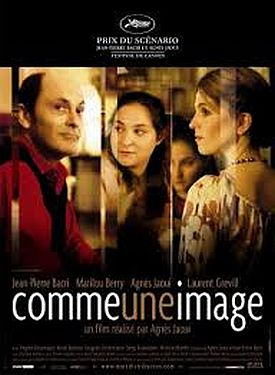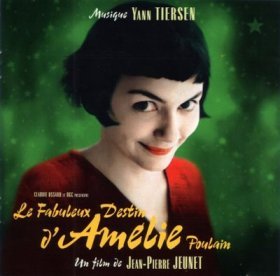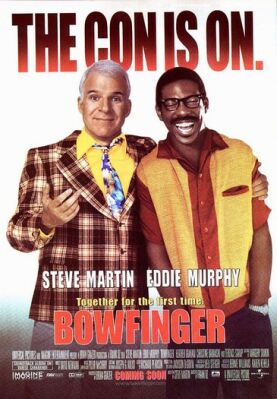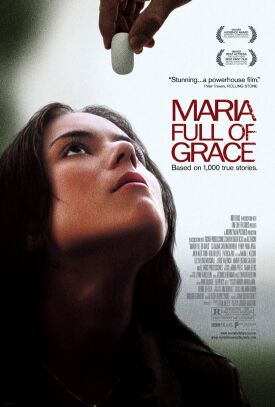Comme Une Image (Look at Me)
Agnès Jaoui’s terrrific new movie, Look at Me, begins in a taxicab as the passenger (Marilou Berry), attempts to get the surly driver (Jean-Pierre Lazzerini) to turn down the radio so that she can hear what someone is saying to her on her mobile phone. When her father (Jean-Pierre Bacri) gets into the cab, he tells the driver he doesn’t like his tone. “Ever hear of courtesy?” he asks. The irony is meant to be withering, and yet we realize too that in our world it is quite possible that the man hasn’t heard of courtesy — or, if he has, that he doesn’t really know what it is. The so-called “comedies of manners” back in the days when there were manners to be comic about were usually gently satirical offerings designed to expose the little hypocrisies upon which civilization was then founded. They could be affectionate about such things because they knew that without hypocrisy there would be no manners. Our cultural loathing for hypocrisy in more recent times is, I think, itself hypocritical, but it is equally a fact of life, and one which has produced the contemporary deterioration of manners that is only ever remarked upon by hypocritical victims — who want to retain title to their own emotional authenticity while denying it to others — and a few old curmudgeons like myself.
Or at least I thought so until I saw Ms Jaoui’s film, which we should perhaps describe as a comedy of no-manners — especially the no-manners we so often display to our nearest and dearest with the excuse that the value we place on authentic feeling exempts us from basic politeness. Ms Jaoui has explored similar territory before, most notably in The Taste of Others (2000), one of my favorite movies of recent years. In that film, as here, she collaborated with her husband and leading man, Mr Bacri, on the screenplay. But where, in the earlier film, Bacri played an uncouth industrialist who is gradually revealed to possess a decency, humanity and even taste that put the intellectual snobs who scorn him to shame, here he is almost the opposite: a prominent writer named Étienne Cassard to whom everyone defers and from whom everyone appears to want something but whose savoir-faire masks his selfishness and cruelty.
These qualities are displayed especially towards the daughter in the cab, poor overweight Lolita. She is an aspiring singer whom he alternately ignores and patronizes. “My big girl,” he calls her with mock affection, hardly unaware of the wound this always inflicts but constantly insisting that he is only joking. Against this background we are meant to observe the effect that Cassard’s selfishness and insensitivity have on a range of other characters, including Lolita’s young step-mother Karine (Virginie Desarnauts), whom she resents for being pretty and the mother of another daughter, aged 5, that her father treats far better than he does her. Into this category, too, falls Lolita’s music teacher, Sylvia, played by Ms Jaoui, and her husband Pierre (Laurent Grévill), another, less-successful writer who cultivates Cassard’s friendship in the hope of advancing his career. Over the course of the film, which includes an eventful visit to Cassard’s country house and a ravishingly lovely recital of music by the amateur vocal ensemble of which Lolita is a member, the two of them are gradually driven apart by their different reactions to Cassard
But it is primarily Lolita’s picture. There is a certain variety of American feminist film-making — for instance, Patricia Cardoso’s Real Women Have Curves of 2002 — which takes a stern moralizing approach to the fact that men, and women too, admire feminine beauty and consider less flesh lovelier than more. How dare they! It would be a shame to confuse Look at Me with such ideologically founded foolishness as that. Its “Look at Me” is not a statement about physical attractiveness but a reminder of the contrast between the capacities of love and self-interest to compel our attention.The size and, to speak plainly, plainness of the heroine are here not moralized or made into virtues. There is no “fat-is-beautiful” boosterism. Instead, the film takes the old-fashioned, pre-feminist view that the absence of physical beauty is regrettable but may be compensated for by other qualities.
It’s true that, at times, it looks as if Ms Jaoui means to flirt with the fashionable but highly dubious doctrine of “self-esteem,” but it is not only Lolita’s self-esteem that is at issue. At one time or another almost all the characters in the film, including Cassard, seem to indulge in self-loathing as the dark and disreputable flip side of their frantic self-assertion. “I’m a zero,” wails Lolita to Sébastien (Keine Bouhiza), the young man she thinks is only interested in her because, like her previous boyfriend, he wants something from her father.
“We’re all zeroes,” Sébastien replies.
“Not as much as me!” insists Lolita. Her comic insistence on being more pathetic than anyone else does not sound to me like a sympathetic account of her deficiency of self-esteem. It sounds more like a critique of it, a recognition that self-disgust is as much a reason for bad behavior as self-love — and much more an excuse for it.
We also see here that, unattractive physically as she is, Lolita has the insecurity of the beautiful — that is, the doubt that any emotional attachments she may inspire are owing to what she regards as who-she-truly-is. What superficial beauty is to them, her father’s influence and importance are to her. But then we all find ourselves in this boat in one way or another and can always find plenty of reasons to doubt that we are loved. The luckiest of us may experience a glorious moment like that at the climax of Look at Me when the clouds of doubt lift and love is as perfectly genuine as courtesy.
Discover more from James Bowman
Subscribe to get the latest posts to your email.







